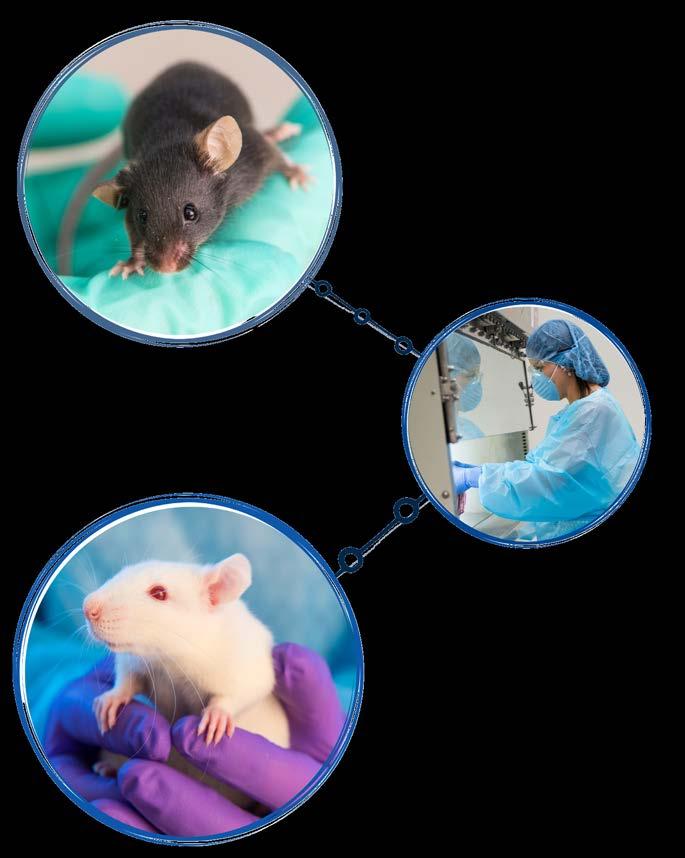
3 minute read
Partners in Scientific Discovery & Responsible Research
Amy Puffenberger
ULAM Staff
From life-saving drugs to vaccines, advancements in organ transplantation to cancer therapies, laboratory animals have played, and continue to play, an essential role in the development of nearly every major scientific breakthrough in human and animal medicine.
Some of these discoveries, including the feline leukemia vaccine, flea control methods, and diagnostics and treatments for diabetes and cancer, have benefited companion animals as well as animals in the wild. These advances would not have been possible without the use of laboratory animals. As one of the nation’s oldest and most-recognized animal medicine programs, the Unit for Laboratory Animal Medicine (ULAM) has provided veterinary care to all animals housed at the University of Michigan for over 50 years. The proper care of laboratory animals involves attending to a wide range of physical and behavioral needs. This includes the provision of clean, appropriately lighted and well-ventilated housing, the ability to exercise, environmental enrichment, proper nutrition, and veterinary health care. ULAM’s dedicated team of laboratory animal care professionals, composed of licensed faculty veterinarians; veterinary residents; veterinary, husbandry, and research technicians; trainers; and research support staff provide aroundthe-clock animal care for the entire U-M research community. In addition to overseeing the standards of care for all animals on campus, ULAM also offers a variety of specialized research support services and a comprehensive training and education program for research personnel.
In calendar year 2020, ULAM supported a total of 32 Principal Investigators (PIs) from U-M’s
Department of Molecular & Integrative Physiology.
This included animal husbandry and housing in 12 different buildings across campus, accounting for approximately 9% of the University’s total animal population. While many of these studies are still ongoing, numerous others were published throughout the year. ULAM is especially proud to have supported Physiology Department research teams with the following studies from the past year: • Unlocking the Secrets of Brown Fat – In two separate studies published in Nature Communications and Science in March 2020, Liangyou Rui, Ph.D., and Ling Qi, Ph.D., both with the Department of Molecular & Integrative Physiology, used mouse models to explore the biology of brown fat and its implications for weight loss and obesity-related diseases. • High Blood Pressure Linked to Baroreflex in Rats – In October, Daniel Beard, Ph.D., Feng Gu, Ph.D., and their team from the Department of Molecular & Integrative Physiology described a newly observed phenomenon in the way blood pressure is maintained
in certain rats in a paper published by JCI Insight. This observation may reveal a new cause of hypertension and could offer clues about which therapies patients may respond to. • The Link Between Obesity and Puberty – Carol Elias, Ph.D., professor of molecular & integrative physiology and obstetrics & gynecology at the U-M Medical School, and her team published a study in the journal iScience which examined two important regions in the brain to try and understand how leptin influences pubertal timing. The mouse study identified genes connecting the onset of puberty to the remodeling of specific brain sites. • Investigational New Therapy Prevents Onset of Dravet Syndrome Symptoms in Mice – Lori Isom, Ph.D., chair of U-M’s Department of Pharmacology and professor of molecular & integrative physiology, and her team have spent several years tracing the developmental pathway of Dravet syndrome, a debilitating genetic disease that causes intractable seizures and can lead to sudden death. Based on the encouraging findings of the team’s mouse study, published in Science Translational Medicine in August, a clinical study has been launched to begin evaluating STK-001 in children and adolescents with Dravet syndrome.
These studies represent only a small sample of the myriad projects currently underway at the University of Michigan and would not be possible without a collective commitment to achieving the highest standards of humane and compassionate animal care. ULAM is honored to partner with the U-M research community in its pursuit of innovative scientific advancements to benefit both human and animal health. •










